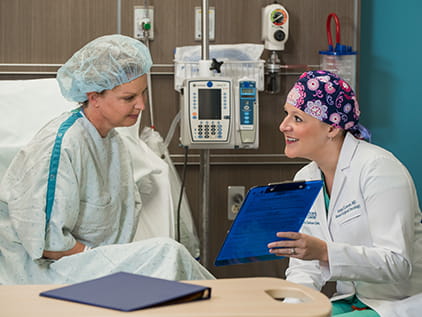Breast Cancer Treatment
The breast cancer care team at The University of Kansas Cancer Center provides first-in-the-world therapies and compassionate care.
We develop a treatment plan based on your individual needs and your particular type of cancer. Our multidisciplinary team of breast cancer specialists works together to tailor a treatment plan specifically suited to your needs. Your team meets weekly to discuss your care and compare it to nationally established guidelines, coordinating treatment strategies for each individual.
When working with our breast cancer care team, your treatment plan may include:
- Breast cancer surgery (mastectomy or lumpectomy)
- Chemotherapy
- Radiation therapy
- Endocrine therapy
- Immunotherapy
- Breast reconstruction
- Clinical trials

Breast cancer treatment options
Writing new cancer success stories is our first priority. We provide next-generation treatments from breakthrough research. Our breast cancer specialists provide the most advanced diagnostic, medical and surgical care for those with breast cancer. This exceptional care includes a team of highly specialized interventional radiologists who offer some of the most advanced diagnostic imaging capabilities available, including minimally invasive biopsies.
The University of Kansas Cancer Center is the region’s only National Cancer Institute-designated comprehensive cancer center and 1 of fewer than 60 nationwide. Comprehensive designation is the highest level of recognition awarded by the NCI and is bestowed only on cancer centers with the deepest and broadest knowledge of cancer. Patients treated at NCI-designated cancer centers have a 25% greater chance of survival than patients treated at other cancer centers. In fact, among women who get a second opinion for breast cancer at an NCI-designated cancer center, 43% have a change in diagnosis.
Before beginning treatment, we will discuss preventive steps that may be appropriate for your care plan:
- Reproductive medicine services: Many cancer treatments can cause temporary or permanent infertility. To ensure the best chances for conception after treatment, we can help you to take steps to preserve your fertility before receiving chemotherapy, radiation or surgery.
- Onco-psychology services: We assist you and your family with emotional support before, during and following treatment.
- Comprehensive cancer care services: We provide nutrition, social work, rehabilitation, personal appearance, wellness, financial and survivorship services as additional support.

Breast cancer clinical trials: changing science, changing lives
We encourage you to talk to your doctor about clinical research trials. Many of these studies are initiated by our own breast cancer investigators, who design and implement the research as we work to provide the most advanced breast cancer care. Through these trials, we evaluate potential new ways of preventing, diagnosing and treating breast cancer, including treatment that lessens side effects.
Life after breast cancer
At The University of Kansas Cancer Center, we treat the whole person, not just your disease. We provide a comprehensive array of cancer support services, including educational resources, social workers, onco-psychology, genetic and financial counseling, rehabilitation, nutrition management, personal appearance services, support groups and wellness programs and breast cancer survivorship services.
In addition, Turning Point, a program of The University of Kansas Health System, offers cancer-related wellness programs and educational classes. Turning Point provides empowering educational programs at no charge, as well as programs for children of all ages.

Your best option for beating cancer
The Women’s Cancer Center at The University of Kansas Cancer Center focuses on breast and gynecologic cancers, providing specialized care to women.
Start your path today.
Your journey to health starts here. Call 913-588-1227 or request an appointment at The University of Kansas Cancer Center.